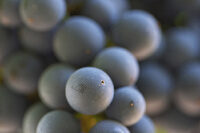Grape Seed Extract The Skin Soothing Benefits
 Grapes are the bountiful fruit that give us wine, juices, jams, and jellies. But these little jewels offer more than just flavor: they are potent antioxidants with a host of skin-soothing and health-enhancing properties. In fact, grape seed extract is a popular skin supplement and health tonic used to treat swelling, lower blood pressure and cholesterol levels, and combat disease and the effects of aging. The University of Maryland Medical Center reports that grape seed extract may inhibit the growth of certain types of cancer cells, including those found in the breast, stomach, colon, prostate, and lung. Since the evidence only exists in test tubes, researchers are uncertain whether grape seed extract provides these same benefits in humans, however.
Grapes are the bountiful fruit that give us wine, juices, jams, and jellies. But these little jewels offer more than just flavor: they are potent antioxidants with a host of skin-soothing and health-enhancing properties. In fact, grape seed extract is a popular skin supplement and health tonic used to treat swelling, lower blood pressure and cholesterol levels, and combat disease and the effects of aging. The University of Maryland Medical Center reports that grape seed extract may inhibit the growth of certain types of cancer cells, including those found in the breast, stomach, colon, prostate, and lung. Since the evidence only exists in test tubes, researchers are uncertain whether grape seed extract provides these same benefits in humans, however.
Skin Health
For those who enjoy sunbathing, proper sun protection is imperative to reducing the risks of sun damage, which include premature wrinkling and skin cancer. However, even those who do not bask at the beach are at risk, especially during the summer months and in warm-weather states. The active compounds in grape seeds (proanthocyanidins) protect skin from sun damage and help prevent some types of skin cancer by inhibiting oxidative stress.
Since grape seed extract is an abundant source of vitamin E, linoleic acid, and flavonoids, it is also a powerful anti-aging tool that every woman should have in her beauty bag. Better than expensive department store creams, grape seed extract helps firm and tighten skin by bonding with collagen, the skin’s primary protein, and a key to maintaining a youthful appearance. Healthy habits also support skin health.
Choosing a Grape Seed Extract Product
As an antioxidant-rich product, grape seed extract not only benefits the skin but also promotes overall health by enhancing the immune system. For this reason, you’ll find grape seed extract as an ingredient in cosmetics and as a general health supplement, sold in capsule, tablet, and liquid forms. The quality of grape seed products varies, depending on the type of grape (red and purple grapes typically contain the most nutrients) and the method of processing. A quality product contains standardized extracts of 40 – 80 percent proanthocyanidins or 95 percent OPC value.
References: University of Maryland Medical Center http://www.umm.edu/altmed/articles/grape-seed-000254.htm

